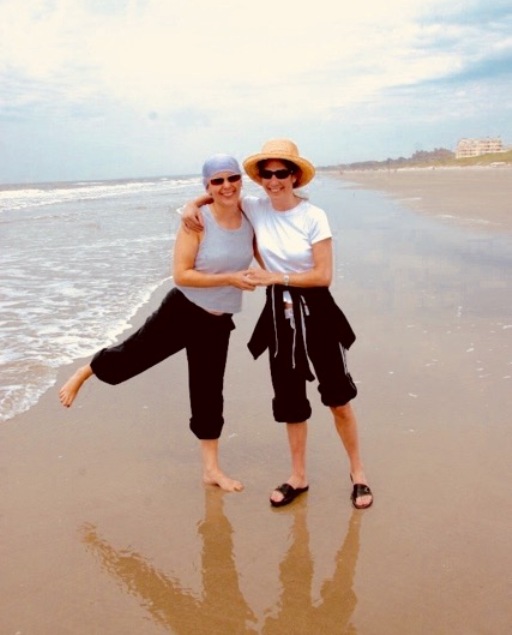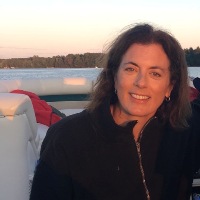
Cancer—we all know someone who’s had the disease, or who is currently battling it.
Imagine, now, that the word has been used to describe what a doctor sees in your labs, your biopsy report, or about what she feels on your skin. Imagine you’re with a family member and they’ve just heard this news. You instantly feel the cold ice pick of fear in your head. The word conjures so many unknowns. But the knowns are truly worse.
How we feel about the word—and the disease—is almost as bad as having the actual cancer.
Feelings can become part of the disease, taking on a life of their own and sullying a perfectly good positive attitude. Just our feelings can create intense anxiety, they’re that powerful.
I’ve heard the word too many times. I have had two bouts of breast cancer myself. My two sisters, both younger, have passed away after their own bouts with breast cancer and the myriad of conditions that develop after treatment.
In my life, and for my own mental survival, I don’t focus on my own diagnoses or my sisters’ deaths. Of course, I miss my sisters every day, and I always will. There will forever be a hole in my life that they used to occupy. But I don’t need their absence or what they experienced at their end to define my daily life or be a cloud over me. Neither sister would want that.
I think I was meant to experience each sister’s illness, treatment, and eventual death for a reason.
And the reason is to not to make the same choices.
Not to take that path.
To question: is there more than one path to wellness after a cancer diagnosis? Do all the expert treatments really equal wellness? Is there health at the end of the traditional path? Because, for some, there is not.
Finding my own path:
I believe in a simple credo from William Shakespeare:.
“To thine own self be true.”
In other words, the choices we make dictate the lives we lead.
What is our life if it’s been wrecked by the simple act of trying to get well? Where is the healing in a broken and weakened body? Or in a spirit that has lost the love for life?
I instinctively cobbled together what I could in the way of my own research. I found complicated medical literature that was over my head, watched videos, read countless books, and talked to other patients and friends. I interviewed more doctors than I can count.
There are so many things outside conventional medicine that everyone with cancer can do: change a diet, add supplementation, meditate, exercise, lose weight, and laugh every day. This list is long.
What do doctors say about their patients wanting to explore the non-traditional treatment options? A patient who looks at new and different ways to treat disease, heal their bodies, and add a little insurance to the whole thing?
Some doctors won’t consider having a patient who doesn’t strictly follow their protocol. Other doctors are open to patients wanting to use a range of treatment models. A rare few doctors encourage their patients to layer on the healing modalities.
Doctor of Internal Medicine, David Knudtson of Northbrook, Illinois, puts it this way:
“Almost all of my patients have an interest in natural remedies. Surprisingly, people with cancer more often want traditional treatment. But my response is always to be open to both therapies (traditional and alternative) but based on efficacy and outcomes. Both are usually best. I personally find that people who do both traditional and alternative medicine have the best outcomes in my practice.”
One conventional surgical oncologist told me while I was her patient that she was glad I was reading the book she saw tucked in my purse: Anticancer: A New Way of Life by David Servan-Schreiber.
“That’s a good one,” she said. “He’s one to listen to.”
On the other hand, Dr. Claudette Baker, L.Ac, a well-regarded acupuncturist and herbalist in the same area, treats patients in a different fashion. She runs the patient—whether suffering from cancer or other ailments—through a detailed intake process. She dissects their diet, sleep, lifestyle, stress level, and support system—an hour-long consultation.
As Dr. Baker says, “There has to be an openness in a patient for real healing to happen. Some patients, especially with cancer, are at the end of hope for themselves. I help them see that they can control the things they can control. For instance, they’re now coming to acupuncture. They can make simple changes to the diet and lifestyle. These things all help, tremendously.”
At the intersection of medicine and self-care:
It takes courage to say no to a doctor. Choosing to take your health in your own hands and, for the most part, buck the conventional medical system feels like an exposure, as if we’re opening ourselves up to criticism.
And that’s when the conflict usually comes—when we get brave enough to expose ourselves to the opinions of others. What doctors or friends say to a patient, and certainly, what families say—all of those words can act like stealthy little seeds that settle into our heads. Those words, unintended or not, affect us almost more than those little rogue cells swimming through our bloodstream.
For myself, in the two years from the second diagnosis, I have added a lot to my life: acupuncture, lymphatic massage, more physical activity, and meditation. I subtracted all junk and processed foods, dairy and meat, and most alcohol and coffee. I try to stay happy and positive and practice yoga and meditation as much as possible. Listening to classical music has proven to be a highlight of my day. I read ideas on how to relax and chill. I try to see beauty, humor, and love in what surrounds me. I read the signs when they come. And, they come all the time.
There are many different ways that cancer shows up in people. The ways to treat it should be just as varied. I believe through my own experiences and those of my family that we have a choice in how we respond to illness and in how we heal. A choice in how our lives unfold after a diagnosis.
Real health comes when we take an active part in it. There are no magic bullets.
In the United States alone, an estimated 1.6 million people will be diagnosed with cancer this year, and according to the National Cancer Institute, about one third of that number will die from the disease. It’s my hope that whatever the path one chooses to take, it keeps them in a life they can live in. And living is not just breathing. It’s finding a vibrancy and awareness and love for something outside ourselves every day. It’s taking pleasure in the breathing.
“But what is happiness except the simple harmony between man and the life he leads?” ~ Albert Camus
~
Relephant:
“F*ck Cancer.” No, f*ck that. How I survived Incurable Cancer.
What Holistic Cancer Treatment Is Not.
~
Author: Elizabeth David
Image: Author’s Own; Genessa Panainte/Unsplash
Editor: Catherine Monkman
Copy & Social Editor: Sara Kärpänen


 Share on bsky
Share on bsky




Read 0 comments and reply